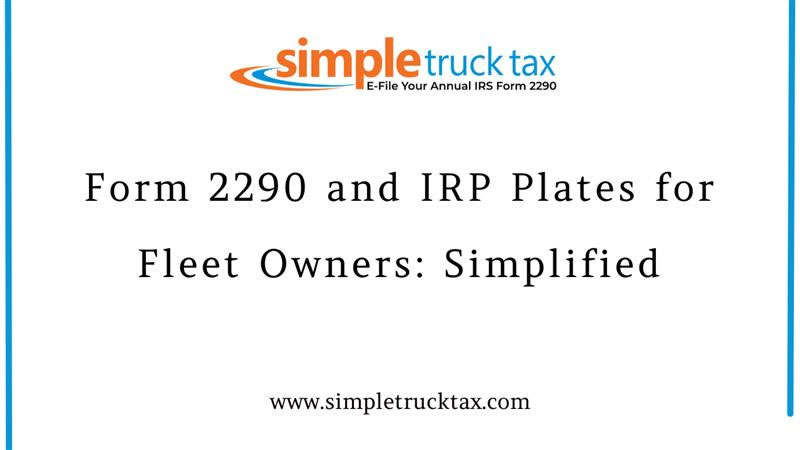
Form 2290 and IRP Plates for Fleet Owners: Simplified
Simplified Form 2290 with IRP Plates for Fleet Owners
There are many more responsibilities involved in running a commercial trucking fleet than simply moving cargo from point A to point B. The two primary requirements for the lawful operation of trucks and trailers in the United States are Form 2290 and IRP (International Registration Plan) plates.
Fleet owners can prevent fines and ensure the smooth operation of their company by being aware of what these obligations involve. Let's examine both of these in more detail and determine the best way to handle them.
Who Must File Form 2290 and What Is It?
A federal tax form called Form 2290 is used to inform the IRS of the amount of tax owed on cars that are subject to Heavy Vehicle Use Tax (HVUT). Every fleet owner who owns a vehicle that weighs 55,000 pounds or more and drives on a public highway is required to register and pay this fee.
The last day to file is often August 31. The filing period runs from July 1 to June 30. Knowing this date is crucial if you want to avoid incurring late fees or interest.
Recognizing IRP Plates and Their Significance
The International Registration Plan (IRP) plates, also known as allocated plates, are what enable the fleet to legally operate in multiple US and Canadian states and provinces without requiring a separate registration in each one. The costs are calculated based on the distance travelled to each location.
A fleet owner must have accurate mileage records and submit an application for registration through their home state. Vehicles may be seized and fines may be applied if the IRP registration renewal is not completed on time.
The Relationship between IRP Plate Registration and Form 2290
Usually, completing Form 2290 is a must for applying for or renewing an IRP plate. A stamped Schedule 1 (payment for HVUT) must always be received before the new plate is provided or the existing plate is renewed in many places where IRP credentials are distributed.
If you fail to submit a 2290 form, your IRP application may be denied or postponed. Therefore, in order to comply with regulations, these two processes are intimately related.
Advice for Owners of Fleets: Remain Effective and Compliant
For fleet owners, e-filing Form 2290 is likely the most practical option. They will also save time because they will immediately receive their payment confirmation. Additionally, the easiest way to monitor your IRP data and prevent penalties in the event that a state franchise tax auditor conducts an audit is to use mileage monitoring software.
Keep track of the entire all heavy vehicle's information, share it, and keep the repair dates on the calendar. Hiring a tax expert or compliance firm to handle these administrative tasks is another method to streamline the process, cut down on errors, and save time.
Knowing the relationship between Form 2290 and IRP plates is essential for any fleet owner who wants to conduct a seamless and lawful interstate operation.
One may ensure that there won't be any penalties or unplanned pauses and switches in the process by adhering to the tax laws and regulations, filing taxes on time, maintaining precise distance spreads, and keeping the registration up to date.
Take the appropriate actions to become a safe and effective fleet manager and prepare for the trucking compliance regulations that are essential to your company's operations today.